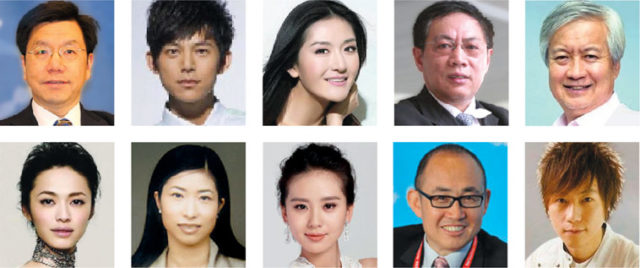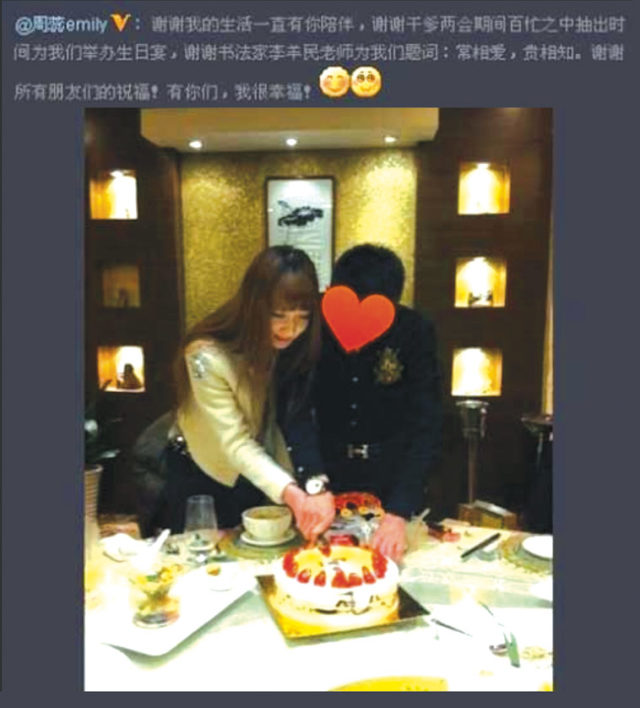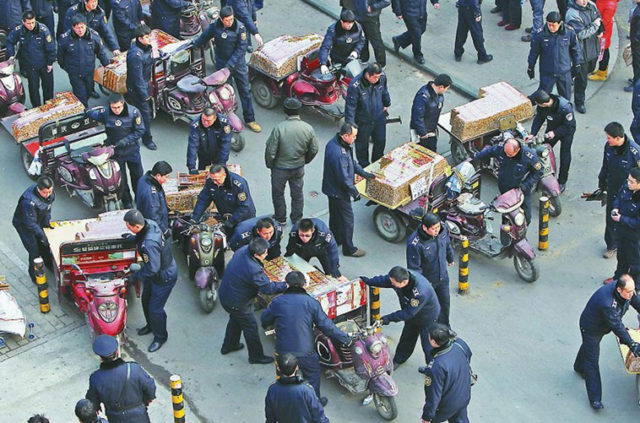THE TOP MOST POPULAR MICROBLOGGERS
Sina Weibo published a list of the most influential Weibo accounts of 2012. The list was devised by evaluating variables such as the number of original tweets, retweets, comments, the downstream ‘influence’ of users retweeting those tweets and leaving comments, as well as the ratio of active to inactive followers of the user. The most influential individuals were:
1. Li Kaifu
Former head of Google China and venture
capitalist
2. He Jiong
Hunan TV presenter
3. Xie Na
Hunan TV presenter
4. Ren Zhiqiang
Chairman of Huayuan Real Estate Group
5. Charles Xue
IT entrepreneur, investor
6. Yao Chen
Actress
7. Amy Cheung
Hong Kong-based novelist
8. Yang Mi
Actress
9. Pan Shiyi
Chairman of SOHO
China, a real estate
company
10. Ashin
Lead singer of the Taiwanese rock band Mayday (Wuyuetian 五月天).

From left to right, top to bottom: Li Kaifu (Source: ITxinwen.com); He Jiong (Source: Advangent.com); Xie Na (Source: Guangming Online); Ren Zhiqiang (Source: Huaqi Business School); Charles Xue (Source: Truezhen IT); Yao Chen (Source: Herschina); Amy Cheung (Source: tkWin.com); Yang Mi (Source: Guangming Online); Pan Shiyi (Source: Xinhua); Ashin (Source: Star-Pedia.com)
THE TOP TEN MICROBLOG TOPICS
Since 2005, Topics (huati 话题) — a series of annual anthologies edited by Yang Zao and published by Sanlian Joint Publishing in Beijing — has been rounding up each year’s most prominent issues. The 2012 installment includes discussions of the Nobel Prize, the controversy over whether the blogger-essayist Han Han has authored all of the work published under his name, the Hong Kong-Mainland culture clash, the Diaoyu/Senkaku Islands contretemps, the party Samaritan Lei Feng, volunteerism and its depoliticisation, imperial court costume dramas, online ‘loser’ culture, current net-speak and food culture.
At the end of Yang Zao’s book is this list of the top ten microblog discussions of the year:
- the Wukan Model [of local democratic reform]
- anti-Japanese demonstrations
- a tale of two Olympics
- storms in Beijing
- depression and senility
- doctors who kill
- National Day gridlock
- whether talent show hosts should be able to see contestants
- foreigners in China
- Guizhentang [a traditional Chinese medicine company that extracts bile from bile bears]
- animal protection.
TOP INTERNET MEMES 2012–2013
This is a list of some of the words and ideas that have recently captivated Chinese Internet users.
Gandie 干爹
Traditionally, this word refers to an honourary father or godfather — a role someone might take on for a friend’s children. These days, it’s gained a new meaning as a euphemism used by younger, kept women to refer to their older lovers. On a program about antiques and jewellery aired on Henan TV in 2012, an attractive young woman brought in a jade pendant for expert appraisal. With great pride, she said the jade was a present from her gandie, adding that he was a real estate developer. To her dismay, the jewellery experts told her the jade, the value of which she clearly expected to be astronomical, was just a cheap fake.
A gandie incident was the source of another Internet meme: ‘pussy-clutching miniskirt’ (qi b xiao duanqun 齐b小短裙), which means an ultra-short skirt that barely covers the crotch. (The crude but popular word for a woman’s crotch is pronounced bi). The term became famous during the National People’s Congress meetings in March 2012 when a microblogger using the name Zhou Rui Emily posted a photo of herself cutting a birthday cake with her gandie, whose face was obscured by a Photoshopped heart, accompanied by the following text:
Thank you for being a constant companion to me in life, thank you, Gandie, for taking time out when you’re so busy with the Two Meetings, thank you to teacher Li Yangmin for the calligraphy he wrote for us that says: ‘Long live love and mutual understanding!’ Thanks to all my friends for their good wishes! If I have you, I am happy!
The mention of a gandie who appeared to be an official of the Congress started a ‘human flesh search engine’ — a collective effort by Internet users who combed through Emily Zhou’s Weibo posts and looked elsewhere online for clues as to her and her gandie’s identities. These searches turned up several photos of her dressed revealingly and posing with expensive cars, and also a photo of her legs and a very short skirt, together with the text ‘One of my little friends says I am forbidden from wearing pussy-clutching miniskirts in the future’.
The expression ‘pussy-clutching miniskirt’ was adopted almost overnight by social media users and by vendors of clothing on Taobao (usually glossed as ‘China’s eBay’), who began advertising short skirts using the new formulation. However, Taobao soon banned the word, although variants still persist: a search on Taobao for the homophomous variant qi bi xiao duanqun 齐比小短裙 in July 2013 turned up 1155 people selling very short skirts. In June 2013, Zhou Rui Emily posted ‘wedding gown photographs’ (hunshazhao 婚纱照) — posed photographs of a bride and groom, usually taken by professional photographer several weeks before, or even as a substitute for, a wedding. The groom was wearing the same Hermès belt as the man in the gandie photographs. As of July 2013, Zhou had 156,344 followers on Sina Weibo, and she continues to post photos of herself in revealing attire.
Diaosi 屌丝

Billboard on Times Square for fantasy game, stating ‘Diaosi, Made in China’ in April 2013.
Source: Sina Weibo
Literally ‘penis thread’, diaosi is a self-deprecating epithet used by men who, sarcastically or otherwise, perceive themselves as losers in society. In a world in which marriage is all too frequently like a commercial transaction, a diaosi might possess the traditional virtues of reliability, industry and loyalty, but lack the requisites for social success in today’s China: wealth, power and good looks. He’s thus a diaosi — a loser unable to win the hand, for example, of a desirably pale, rich and pretty (bai fu mei 白富美), if icy, goddess.
After percolating across online gaming forums for several years, the term diaosi burst into the public consciousness in 2012. It was soon adopted by wealthy celebrities who were by no stretch of the imagination losers, such as Shi Yuzhu, the billionaire founder of the gaming company Giant Interactive. In April 2013, Shi’s company bought a billboard ad in New York’s Times Square promoting the interactive fantasy game ‘The Mythical Realm’ with the words ‘Diaosi, Made in China’. The billboard was taken down once the ad company was informed of the term’s meaning.

Yang Dacai, smiling, at the site of the tragic collision where thirty-six people lost their lives.
Source: Sina Weibo
Watch Brother (biaoge 表哥)
Yang Dacai, a safety official in Shaanxi province, became the object of public ire when he was photographed with a smirk on his face at the scene of a deadly multi-car accident in Yan’an on 26 August 2012, an incident later dubbed ‘Smile-gate’ (weixiaomen 微笑门). Angry Internet users scoured the net for additional incriminating evidence and turned up a variety of photographs in which Yang was wearing different pricey foreign watches. A subsequent investigation revealed that he owned eighty-three watches and had more than sixteen million yuan in cash and bank deposits that couldn’t legally be accounted for. Yang was removed from his posts on 21 September and dismissed from the Party on 22 February 2013, after which his case was turned over to the criminal justice system.

Prompted by the question ‘Are You Happy?’ the man replies ‘Don’t ask me, I’m an itinerant labourer.’
Source: CCTV
Are You Happy? (Ni xingfu ma? 你幸福吗?)
Beginning in October 2012, the state broadcaster China Central Television sent its reporters into the streets to ask people across the country if they were happy. Their answers, some of them unexpectedly hilarious, aired on the nightly newscast and became a running meme that was referenced in the 2013 Spring Festival Gala.
Sparta 斯巴达
Preparations for the Eighteenth Party Congress in November 2012 involved beefed-up security and Internet censorship, including a ban on discussing the Congress itself. The colloquial name for the Congress, Shiba Da 十八大, is a near-homophone for the Chinese term for the ancient Greek city-state of ‘Sparta’, and so the substitution proliferated across China’s social networks, along with copious references to the 2007 American action film 300, which reimagines the Battle of Thermopylae. ‘My Internet speed is becoming slower and slower’, one Sina Weibo user complained. ‘Is this because Sparta is coming?’
Qiegao 切糕
A price dispute over qiegao — a common Uyghur snack made of sugar, honey, nuts and dried fruit — caused a brawl in Yueyang, Hunan province, in December 2012 that resulted in police ordering a customer to compensate vendors for the value of their destroyed goods: 160,000 yuan. The size of the compensation turned qiegao into Internet joke fodder: ‘Dear Gandie,’ reads one, ‘if you love me, don’t give me a maserati or Louis Vuitton bags; I just want a piece of qiegao.’






